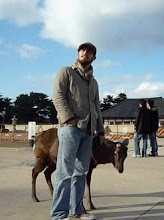Lunch Time Dodgeball: Survival of the Fitest

As much fun as the classes were and also eating lunch with the kids by far the funniest part of the week was playing dodgeball with the kids during lunch break. Dodgeball is so popular with kids in Japan, so during breaks all the kids run outside and play dodgeball with their individual classmates. Since Seika-dai Elementary is 1st~6th grade and there are roughly 4 classes per grade there are about 24 classes which means 24 games of dodgeball going on simultaneously. The schoolyard is about the size of a football fields but with 24 dodgeball games going on it turns into a battlefield! All the dodgeball courts are right next to each other so stray balls are flying everywhere and random kids are getting hit left and right.
Plus the kids are fervent about dodgeball. Whenever someone is hit and sent out a cry of joy arises. Kids are diving onto the dirt ground to be the first one to recover the loose ball and then jump up to get a running start to throw the ball. Then to top it all off this week the games were divided boys against girls. So the boys take no mercy and the girls are bent on revenge and evening the score. The first day that I played with the 2nd graders no less than 3 or 4 kids in 15 minutes got tagged in the head and ended up crying, one of those was a boy that got hit by his female teacher. Then today despite my effort to not throw as hard as I can I accidentally hit a girl in the head because she tried to duck my throw. She started balling tears and snot and fell to the ground. I felt horrible and picked her up and apologized profusely. All the other girls said not to worry as she apparently cries over everything but I still felt horrible. But then again its all part of the game.
Lunch time dodgeball at Japanese elementary schools is chaos. Its like a battlefield with rubber balls instead of bullets. The scene reminds me of a something from “Lord of the Flies.” But it is also so much fun and the kids know better than anyone else that its kill or be killed in the dodgeball arena! Actually I used to play dodgeball everyday when I was in elementary school too and I can remember the savagery, bloody noses, fear and thrill of the sport. I guess the saying is true no matter where you are, “kids will be kids” and kids love dodgeball!
Labels: dodgeball, elementary, japan





